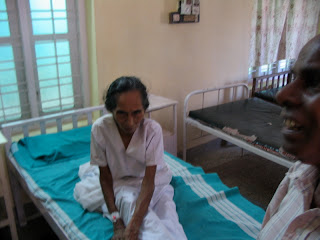
We still haven't had much time to blog. Our apologies. The schedule has been grueling. A van shows up for us shortly after sunrise each morning and drops us off as late as 11 p.m. each night. Still, we're trying to keep you updated as much as possible with photos and few words. Many of the details and reflections on how we can learn from the incredible work and acts of faith in India's Christian community will have to wait until we return home and give our big multimedia presentation. We spent Wednesday afternoon at the Madhaya Kerala Diocese's Tsunami Village, where the church built rows of homes for survivors displaced by the 2004 Tsunami. Walking around the village, Bishop Itty remarked that a good story would be "FEMA vs. the church." Seeing a need, the Anglican Church of South India found a way to build these suffering families a place to call home -- finding the money and the land right after the natural disaster hit India's southern coast. We're seeing a lot of that in India: A diocese constantly finding ways to aid those who need homes, comfort, education and peace in meaningful ways. Not a lot of money and material wealth, but a diocese rich in spirit and grace. And tremendous faith. Yesterday, Bill Lupfer was asked by an educator to reflect on what he has seen so far. He said: "The people of Kerala have a real commitment to living the Gospel the way Jesus teaches rather than what people are comfortable with." That about sums it up. Stay tuned.

The tsunami village is near the banks of Kayakulam Lake, which connects to the Arabian Sea. The 2004 tsunami washed over the lake shore with a rush of water. "A man came up to me after worship service and said, 'The sea is coming,'" said the Rev. Matthew Jilow Ninan of St. Peter's CSI Church. The wave, about knee-deep for an adult and waist-high for children, nearly reached the church, he said.









 -- allowing the diocese to continue funding health-care programs for the area's poor.
-- allowing the diocese to continue funding health-care programs for the area's poor.










